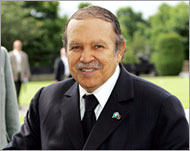Algerian patois delights and disturbs
As an Arabic speaker, Syrian businessman Ziad Karam thought he would feel at home in Algeria. How wrong he turned out to be.

“I need language training to understand my Algerian brothers!” Karam, 42, said.
“It’s so complex, the sound so unusual, that I’ve decided to use an interpreter during my stays in Algeria.”
Unlike neighbours in Morocco and Tunisia, Algerians speak a dense patois, a mixture of Arabic, Berber, French and sometimes Turkish, that most Arabs cannot fathom.
This fact of Algerian life, long familiar to Algeria’s Maghreb neighbours, is being discovered anew by the latest influx of expatriates, some of them Arabs from the Levant and the Gulf, drawn here as the country opens to foreign investment.
Historical influence
Almost five decades after independence from France in 1962 and following a decade-long Islamist insurgency, Algerians employ an everyday speaking style as mixed as their identity and history.
The linguistic jigsaw puzzle reflects the many civilisations that have occupied the North African country – Phoenicians, Romans, Byzantines, Arabs, Turks and French.
In a recent speech, President Abdel Aziz Bouteflika, said “when other Arabs listen to someone mixing Arabic, Berber and French, they say he’s Algerian. It’s become our trademark!”
Bouteflika, in sympathy with traditionalists, says he would like Algerians to speak better Arabic.
Understanding Algerian speech is not easy.
In a single sentence, the subject might be in Arabic, the verb in French, the predicate in Berber or Turkish.
Let’s try this: A car hit Mohamed, who was taken to hospital.
In Algerian patois: Mohamed darbattou tonobile, dattou direct el sbitar.
In this example, the verb is in Algerian dialect, the word car is in a kind of French, sbitar is Turkish, and the intonation is taken from the Berber Kabyle language.
The result may infuriate foreigners.
No apology
But to many Algerians it’s just normal – and certainly nothing to apologise for.
“So what? This is the way we speak in Algeria. I don’t see why our president is mad at it, I don’t feel ashamed of my language,” university teacher Farid Fareh said.
“So what? This is the way we speak in Algeria. I don’t see why our president is mad at it, I don’t feel ashamed of my language. It’s an open country – open to cultures and languages” Farid Fareh |
“It’s an open country – open to cultures and languages.”
In the past, this openness was imposed by outsiders.
For 300 years from the early 16th century, Algeria was part of the Ottoman empire under a regency that had Algiers as its capital. Turkish was the language of government.
During this period, the modern Algerian state began to emerge as a distinct territory between Tunisia and Morocco.
Spain occupied the western town of Oran between 1509 and 1790, leaving traces of Spanish in the dialect of that city.
Algeria came under French occupation from 1830 to 1962, a period in which many Algerians lost their lands and much of their culture to colonists.
French became the official language.
Arabic and Kabyle
Eager to remove the vestiges of colonialism after a brutal independence war, Algeria made Arabic the country’s official language and promoted it over French in schools.
As a result, while many elderly Algerians speak excellent French, most younger people lack the same fluency.
The status of French, which is still the language of business, remains an uneasy topic between both governments.
 |
|
Bouteflika: We are identified by |
Unlike Morocco and Tunisia, Algeria is not a member of the Francophonie organisation, the body which promotes the learning of French around the world.
Then, there is Kabyle, a language used in the Berber Kabylie region east of Algiers.
Berbers, who make up a fifth of the country’s 33 million people, have long waged a tumultuous campaign for greater rights, including recognition of Kabyle.
The last big crisis began when a schoolboy in Kabylie died in police custody in 2001.
The death led to clashes with police in which 126 protesters were killed and thousands were injured.
The government recognises Kabyle but it is not an official national language in which government business can be done.
Reflection of age
For many Algerians, struggling to make ends meet, the country’s linguistic diversity is the least of their problems.
“One hundred and thirty years of French occupation, 30 years of Sovietism, 13 years of terrorism and Algeria is still alive! It’s a miracle, so I don’t care whether the language is pure or not,” Farid Fareh, the teacher, said.
Increasingly, language is a reflection of age, not region, in a country where 70% of the population is under 30.
 |
|
Language is increasingly a |
Listen to Mohamed Anis, a 25-year-old dressed in Levis, Ray-Ban sunglasses and a Che Guevara T-shirt, explain his approach to life: “Hna Kaoum El Rapid, lazam tbougi bach takoul el rougi” or “We belong to a speedy generation, you have to move fast if you want to live decently”.
To most people over 60, he’s talking gobbledygook.
“This is not a language. This is nothing but noisy sounds,” said Khelifa Cheraiti, a 65-year-old retired Arabic teacher.
But Nacer Jabi, a sociologist, believes Algeria’s mixed language is not a problem.
“Algeria’s youth doesn’t have any problem of communication. Those who have a problem belong to the generation over 60. We have a clash of generations, not a clash of languages,” he said.
*Photo courtesy of Elias Temlali